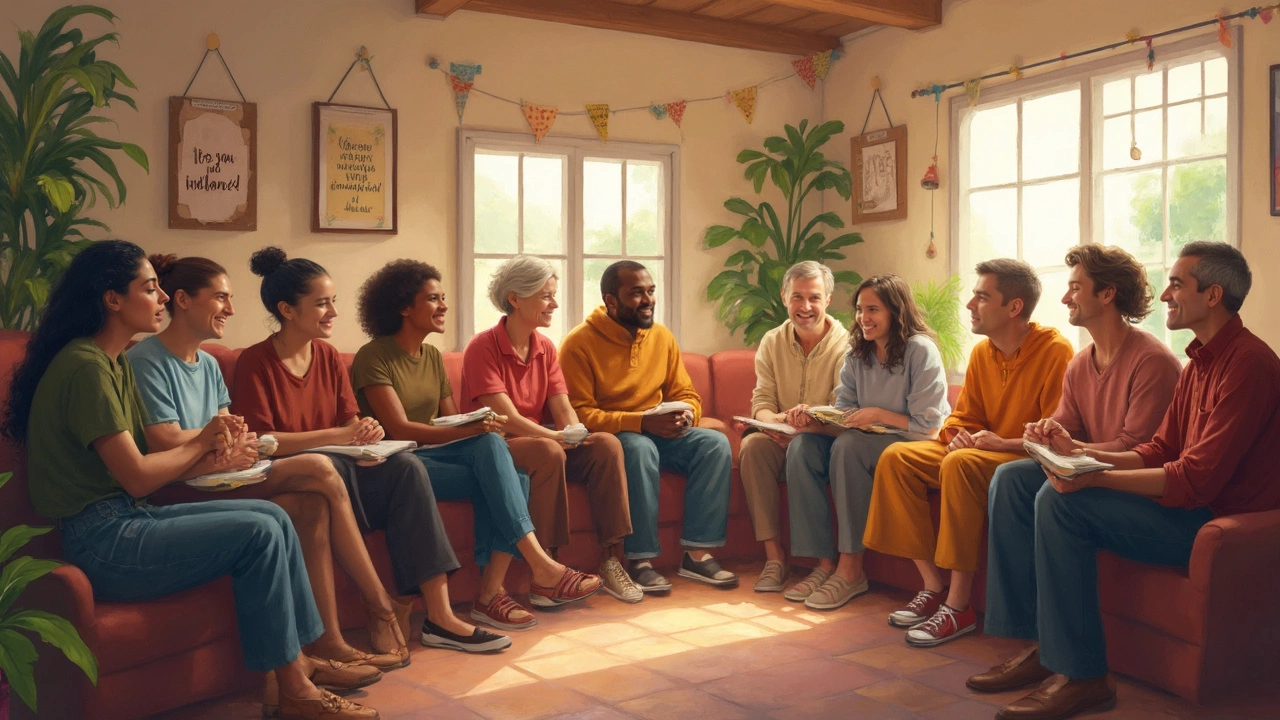Looking for a support group in your neck of the woods? Whether you're dealing with anxiety, grief, or just need a nudge from folks who understand, joining a group can make all the difference. So, how do you track one down? Spoiler: It's easier than you might think.
First stop? The internet, of course. Almost everything's online these days, and support groups are no exception. Websites like Meetup or mental health platforms can hook you up with local groups or even virtual sessions if that's more your jam. And don't overlook good old social media—many groups have Facebook pages where they post events and provide more details.
- Why Support Groups Matter
- Using Online Tools
- Seeking Professional Advice
- Local Community Resources
- Evaluating Your Options
Why Support Groups Matter
So, why should you even consider joining a support group? It's about finding a community that gets you. You know, people who’ve been there, done that, and can say, “Hey, I understand.” Whether you're managing stress, adjusting to a new lifestyle, or going through a tough time, there’s a real benefit to having others who not only listen but also share their journey.
A sense of belonging is a big deal. According to Mental Health America, “Support groups bring together people facing similar issues, providing comfort and advice.”
“The connection you make in a group can become a lifeline, allowing you to feel less isolated and more understood.”That’s straight from Psychology Today—talk about making a powerful point! You’re not just a face in the crowd anymore.
Support groups can also give you that extra nudge to improve your skills, be it coping mechanisms for anxiety or managing symptoms of a physical ailment. Plus, they're a sweet source of practical advice. Someone in your group might have that tip or trick that makes something easier. Imagine a lightbulb moment where you go, “Why didn’t I think of that?”
- Peer support can decrease the feeling of loneliness.
- Groups often share resources and information you won't easily find elsewhere.
- You get to vent. Seriously, sometimes you just need to let it out, without judgment.
Plus, research shows that people in local support groups often experience lower levels of anxiety and increased coping skills. If you’re skeptical, consider giving it a shot. You might just find what you didn’t know you needed.
Using Online Tools
Thanks to our digital age, finding a support group is just a click away. When diving into the online world, there are several handy tools and platforms to guide you towards the right community.
First up, there's Meetup. It's not just for yoga classes or book clubs anymore. A quick search with your location and interests can reveal numerous local support groups. Be sure to read the group descriptions to ensure they meet your specific needs, whether it's anxiety management, bereavement support, or something else entirely.
Another great resource is SupportGroups.com. This platform offers connections to thousands of groups across various categories, and many now offer virtual meetings too. It's a perfect way to connect if you're hesitant about face-to-face interactions right away.
Social media is another ally in your search. Facebook groups have long been a hub for community discussions. When you join a group, check the frequency of updates and the engagement level. A vibrant and active group with regular posts can be a sign of a healthy community.
Don't forget platforms like Reddit. Subreddits dedicated to specific issues often have advice and links to more structured local support organizations. Just be mindful of personal privacy, as discussions here can be public.
Lastly, look for apps like BetterHelp or Talkspace if you're open to exploring professional help alongside group support. They sometimes collaborate with local communities, offering hybrid models of care.
With these tools, your search for a support group becomes not just easier but can also be fine-tuned to find a perfect match that fits your comfort and convenience.

Seeking Professional Advice
Ever feel stuck on where to start finding that perfect support group? Sometimes, the best move is talking to someone who knows the ropes. Professionals like therapists, counselors, and social workers can point you in the right direction.
Think of these pros as your personal guides. They usually know about local community groups or other local support options right in your area. Plus, they've probably got insights into which groups have a great vibe and which might not be the right fit.
"Sometimes, just a little direction from a professional can make all the difference," says Dr. Susan Lowell, a clinical psychologist. "They can match you with groups that align with your personal journey."
Here’s a quick checklist on how to make the most out of seeking professional advice:
- Ask your therapist or counselor. They're well-connected and can suggest groups that they think would be awesome for you.
- If you're visiting a clinic or hospital, don’t shy away from asking the staff there. Many hospitals have their own lists of local support meetings.
- Your primary care doctor can also be a good resource. They often work closely with mental health professionals who run group sessions.
Remember, the aim is to find a group that feels like the right place for you. Professionals can help narrow down your choices, making it easier for you to find that welcoming space where you can share and grow. So, don’t hesitate to reach out and ask for help when you need it.
Local Community Resources
When you're looking for support groups nearby, local community resources are a hidden gem. Many towns and cities, regardless of size, have community centers, libraries, and even churches that host local support meetings or can point you in the right direction. Don't be shy about heading to your local library. They usually have bulletin boards or directories offering a host of community events, including support group listings.
Community centers are another fantastic spot. They often offer low-cost or even free access to various groups. In bigger cities, these centers may have an entire calendar section dedicated to different community groups. Penny Clark, a community resource advisor, says,
"Sometimes folks are surprised to see just how many options are right under their noses. Local centers can be a lifeline for many."
- Check the city website: Cities often list community events online.
- Ask a librarian: Libraries are underrated hubs of local information.
- Look at local health clinics: They often know about targeted support groups.
Engaging with these resources not only connects you to a group but also puts you right in the heart of your community. The odds are you’ll find new friends and support in places you never even thought to look. If you prefer a personal touch, drop by the center—there might even be someone to help you narrow down your search on the spot!

Evaluating Your Options
So, you've found some potential support groups nearby and you're probably wondering, "How do I pick the right one?" It’s crucial to find a group that feels like a good fit. A supportive environment can make a huge difference, so let's break down what to consider.
First, think about the group's size. Do you prefer a smaller one where everyone gets a chance to speak, or are you comfortable in larger spaces with lots of chatter? Smaller groups can offer more intimate connections, while larger ones might bring diverse perspectives.
Next up: frequency and timing. Check how often the group meets and whether it fits your schedule. Weekly gatherings are pretty common, but some might meet bi-weekly or monthly. You’ll want something that complements, rather than conflicts with, your routine.
Also, consider the facilitator's role. A skilled leader can steer discussions and ensure everyone gets a turn. Look for groups led by trained professionals if you value structured guidance. This might be especially true for support groups focused on mental health topics.
Don't forget the group’s atmosphere and communication style. Some are structured with set topics, while others are more free-flowing. Attending a trial session could be a smart move to get a sense of the vibe.
Here's a quick way to get a feel for a group:
- Contact the organizer beforehand. Most are happy to discuss what you can expect.
- Attend a first meeting as a guest (lots of groups offer this option).
- Note your comfort level during and after the meeting.
- Reflect on whether you felt heard and welcomed.
Look for details like anonymity and confidentiality practices. Make sure there’s a clear understanding of what's shared in the group stays in the group. It’s all about making sure you feel safe and secure.
